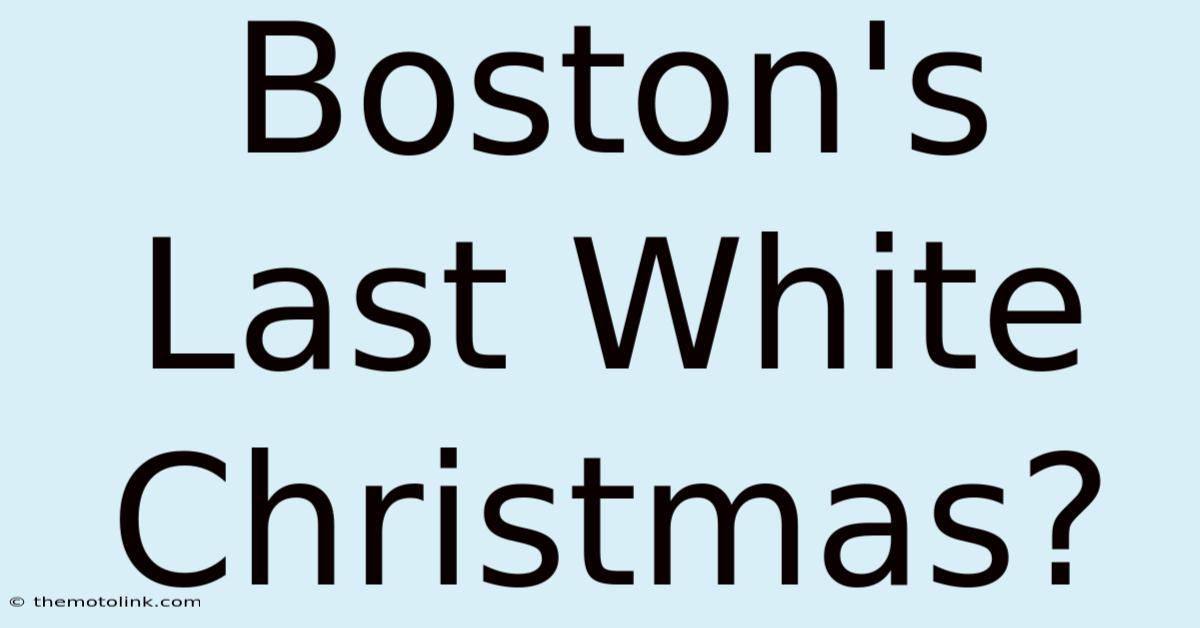Boston's Last White Christmas?

Discover more detailed and exciting information on our website. Click the link below to start your adventure: Visit Best Website nimila.me. Don't miss out!
Table of Contents
Boston's Last White Christmas? Unpacking the Myth and the Reality of Snow in Beantown
Meta Title: Boston's Last White Christmas? Snowfall Trends & Future Predictions
Meta Description: Discover the truth behind Boston's last white Christmas. We explore snowfall trends, analyze historical data, and predict the future of winter in Beantown. Learn about climate change's impact and what it means for future holidays.
Did you know that a "white Christmas," defined as at least one inch of snow on the ground on December 25th, is becoming increasingly rare in many parts of the world, including Boston? While the image of a snow-dusted Boston skyline on Christmas Day is iconic, the reality is more complex. This article delves into the fascinating history of snow in Boston, examines the recent trends, and explores the future of white Christmases in the city.
The Backstory: A Century of Shifting Snowfalls
Boston's climate has always been characterized by fluctuating snowfall. Looking back at historical records, we find that significant variations in snowfall amounts have occurred over the past century. While some years boasted abundant snow, others experienced surprisingly mild winters. For example, the winter of 1911-1912 saw a whopping 106.6 inches of snow, a stark contrast to the relatively snowless winters of the late 1990s and early 2000s. This variability makes pinpointing the exact date of Boston's "last true white Christmas" difficult, as the definition of "true" varies. Some may consider even a light dusting sufficient while others require a significant accumulation. However, we can analyze trends to understand the likelihood of future white Christmases.
(Suggest image: A historical photo of Boston during a snowy Christmas, circa early 20th century. Alt text: "Historic Boston Christmas Snowfall")
Key Insights: Declining Snowfall and Climate Change
One of the most significant factors affecting Boston's snowfall is climate change. Rising global temperatures are leading to milder winters and reduced snowfall in many regions. While individual winters can still be highly variable, the long-term trend points towards a decrease in the frequency and intensity of snowstorms in Boston. This means that white Christmases, while still possible, are becoming less likely.
- Decreased Snow Cover: Studies show a clear decline in the duration of snow cover in the Boston area.
- Warmer Temperatures: Average winter temperatures have been rising, making it harder for snow to accumulate and persist.
- Shifting Storm Tracks: Changes in atmospheric circulation patterns may also be contributing to altered snowfall patterns.
(Suggest image: A graph illustrating the trend of snowfall in Boston over the past 100 years. Alt text: "Boston Snowfall Trend 1920-2020")
Actionable Tips: Preparing for a Variable Winter
Regardless of the long-term trend, Boston residents still need to prepare for the possibility of snowfall, even if white Christmases become less frequent.
- Winterize your home: Insulate pipes, check your heating system, and stock up on essential supplies.
- Check your car: Ensure your tires are in good condition and you have winter emergency supplies in your vehicle.
- Stay informed: Monitor weather forecasts regularly, especially during the winter months.
Expert Opinions/Trends: Meteorological Perspectives on Boston's Future Winters
Meteorologists and climate scientists generally agree that the trend towards milder winters in Boston is likely to continue. While predicting specific snowfall amounts for individual years remains challenging, the overall probability of a white Christmas is decreasing. The National Weather Service and other reputable sources provide valuable insights into these trends. Experts suggest that rather than focusing on a single "last" white Christmas, we should prepare for more variable and potentially less snowy winters in the years to come.
(Suggest image: A map highlighting the regions experiencing decreased snowfall due to climate change. Alt text: "Climate Change Impact on Snowfall in Northeast US")
Future Implications: Adapting to a Changing Climate
The declining likelihood of white Christmases in Boston is just one manifestation of broader climate change impacts. Understanding these changes and adapting to them is crucial. This requires a multifaceted approach:
- Mitigation: Reducing greenhouse gas emissions is vital to slowing the rate of climate change.
- Adaptation: Investing in infrastructure and planning that accounts for more extreme weather events is necessary.
- Community Preparedness: Educating the public and building community resilience to weather-related disruptions is essential.
Conclusion:
While the exact date of Boston's "last white Christmas" is debatable, the trend towards less frequent and less intense snowfall is undeniable. Climate change is altering winter weather patterns, impacting not only the festive season but also the broader ecological and societal landscape. What’s your opinion on the changing winter landscape in Boston? Do you think we will see a return to heavier snowfalls in the future, or is this a permanent shift? Share your thoughts below!
(FAQs section with schema markup could be added here, covering questions like "What is the average snowfall in Boston?", "How does climate change affect snowfall?", and "What is the probability of a white Christmas in Boston?")

Thank you for visiting our website wich cover about Boston's Last White Christmas?. We hope the information provided has been useful to you. Feel free to contact us if you have any questions or need further assistance. See you next time and dont miss to bookmark.
Featured Posts
-
Home Alone Streaming New Movie Updates
Dec 25, 2024
-
Snowboarder Hediger Dies In Avalanche
Dec 25, 2024
-
Mega Millions 1 B Jackpot At Christmas
Dec 25, 2024
-
Nate Bargatze And Laura Their Story
Dec 25, 2024
-
Christmas Eve Dinner Fort Worth
Dec 25, 2024
